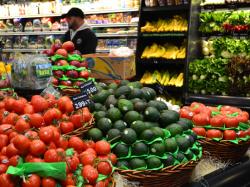Spotlight On Mexico: Two Avocado Producers Aim For Export Diversification
July 20, 2016 | 4 min to read

Like many companies of its kind in Mexico, Sonora-based tomato producer Chucho Produce is overwhelmingly focused on the North American market, namely the U.S., and to a lesser, extent Canada. What arguably separates the company from its peers, however, is its ambition. Rather than being content with its current position, Chucho is actively seeking to expand into new markets, particularly in Asia, and is developing convenient packaging options for its U.S. clients.
One of the largest tomato producers in the Northern state of Sonora, Chucho has around 220 hectares (close to 550 acres), according to managing director Juan Diego Morales. Chucho produces 13,000 cartons of tomatoes per hectare, some 90 percent of which is exported to the U.S., with the remainder sold on the domestic market.
Although it also produces cucumbers, jalapeño peppers and maize, tomatoes (under glass) are Chucho's core business, and the majority is for the U.S. market.
Products are also exported to Canada through Rio Rico, AZ-based Chucho Produce U.S. By contrast, much of the company’s U.S. business is done directly with supermarkets.
“Mexico generally sells lower quality tomatoes than the U.S., but you can only work in the U.S. with quality,” explains company founder Jesus Ruben ‘Chucho’ Gutiérrez. “You can’t grow in open fields. You need to have protected production with all the necessary certifications, and you need to make sure you comply with all the food safety regulations.”
Gutiérrez says Chucho Produce has made major progress during the past 12 months, explaining that the company’s continuing success has been based on “doing things well.”
In the summer, “when we don’t have volumes available, we travel to speak with clients to find out what quality they require, what quantities and by what dates,” he says. “We do a lot of pre-sale work, so when it comes time to sell the produce, we have agreements in place.”
FAR EAST FOCUS
Morales reveals that Chucho Produce also recently visited Shanghai, China, with a view to securing clients in the Far East. He believes future growth for the company will take place in Asia as well as in the U.S. “At the moment, we are present in the U.S. and Canada, but we want to also be in Asia,” he says.
Although tomatoes and cucumbers will be the focus for Asia, Morales says another of the company’s objectives for its China visit is to find out what opportunities are available in Asia markets, and if there are gaps in production suitable for Chucho’s exports. “We went to Shanghai to knock on the door and ask, ‘What are you lacking; what products do you need,’” he says.
Closer to home, Gutierrez says Chucho is aiming to grow its market share in North America without necessarily increasing production volumes. “We simply want to focus on selling the best possible products. Once we are doing that 100 percent, then we can look at increasing production,” he explains.
He says Chucho Produce is looking to add value to its product range, through new packaging and convenient, ready-to-eat options. “We are developing bags with four to seven tomatoes weighing from 1 pound, 100 grams, to 2 pounds; because, in general, most women now work and go to the supermarket every day, so they are not looking to buy bags for five days. This is very similar to what has been happening in Europe,” says Gutiérrez.
However, challenges remain ahead of future growth, not least among them from the impact of climate change, which Morales says presented real difficulties for the grower. “The market is always challenging, but the changing climate does not always let you meet your projections, because sometimes the rain is a week early, or it’s hot when you don’t expect it. I think this is the principal challenge that we face,” he says.
FROM MEXICO OUTWARD
Further south, in Michoacán state, lies a Mexican avocado producer that has a keen eye on increasing exports. A family-owned firm, Sánchez Aguacates Hass, has been producing the avocados that lend the company its name for some 33 years in Michoacan and the neighboring state of Jalisco.
Until recently, Sánchez Aguacates Hass sold the vast majority of its volumes on the Mexican market, according to head of sales, Israel Sánchez Mateo, who says the company has developed a niche in its own country, whereas most growers are focused on export to the U.S. or Japan.
However, Sánchez says the firm is now focused on increasing exports to the U.S., among other markets, ahead of an expected increase in volumes. Producing some 20,000 ton of avocados each year — 90 percent of which is sourced from allied growers, with the remainder its own production. Sánchez Aguacates Hass expects to see volumes rise to 22,000 tons this year, and exports increased in importance. “Approximately 80 percent is for the domestic market, and 20 percent for export, but we want to increase this to 50/50, so we are not so dependent on a single market,” says Sánchez.
“At the moment, we are looking at other markets — we just started in Europe. These are just small volumes, but we are exporting to the Netherlands, and we are also developing our market share in the U.S., Central America and Japan,” he says.
Source: PRODUCE BUSINESS
